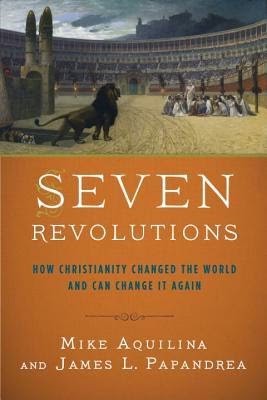Catholic Review: Seven Revolutions
Seven Revolutions: How Christianity Changed the World and Can Change it Again by Mike Aquilina and James L. Papandrea, February 24, 2015. 256 pages. Published by Image. Source: Blogging for Books.
Seven Revolutions was not an easy read. Not that the writing was bad or the topic uninteresting, it was more that there was so much to it, some that I regret reading during lunch, that made it a book to be read slowly over a couple of weeks. Historically and Church-wise, there is so much for one to process in this book that I a) highly recommend reading it and b) recommend taking your time to fully immerse yourself in some interesting hard-truths.
Given the culture we currently live in, one that unfortunately resembles that of Pre-Christian Rome more and more each year, I found Seven Revolutions to be quite relevant. So with the similarities between the times that the early church lived through and that of our own can in a nutshell come down to two big points. Respect for both life and religious freedom. Two things which are collapsing in our modern world and that are also viewed through a narrow lens by liberals and media. While I could probably write an entire post about my thoughts concerning two big things talked about in this book, I am going to, try (key word), to not go off on a tangent.
Seven Revolutions, is the kind of book that I would like to see more of. It is not only well written but covers some very important topics that can help shape the world. While this book isn't going to bring about world peace-I doubt it would be that easy- I enjoyed seeing the contrasts between the problems we are currently facing and those of Pre-Christianity times. I am bumbling this review left and right! There's just so much to discuss and my brain is flitting all over the place, so...moving on.
Mike Aquilina has been one of my favorite Catholic writers, well, at least since I first read something of his last year. While I had never read anything by James Papandrea before this book, I thought they did an overall great job working together to create an excellent book. While this book does take some time to read, it is one that you should not miss out on. There are so many things within the bindings that will give you much to think upon (at least it gave me much...oh wait, I'm still processing this book).
Final Verdict: Seven Revolutions- Too many reasons why you should read this, so...just read it. It's a great look at what religious freedom and respect for life means to not only Catholics but all Christians.
Seven Revolutions: How Christianity Changed the World and Can Change it Again earns
this book was received through Blogging for Books in exchange for an honest review.
Combining history, politics, and religion, Mike Aquilina and Jim Papandrea provide practical lessons to be learned from the struggles of the Early Church, lessons that can be applied to the day-to-day lives of Christian readers.
Prolonged, multiple wars in the Middle East. Waves of immigrants crossing the borders. Ongoing economic recession. Increasing political polarization, often with religious overtones. Conflicts over ideologies that pit the progressive against the traditional. Sound familiar? These conditions not only describe the United States, but the situation of the Roman Empire in the third century. That situation led to religious persecution and the eventual collapse of the empire. In the middle of the third century, the Roman Empire was roughly the same age as the United States is now.
In this book, authors Mike Aquilina and Jim Papandrea examine the practices of the Early Church—a body of Christians living in Rome—and show how the lessons learned from these ancient Christians can apply to Christians living in the United States today. The book moves from the Christian individual, to the family, the church and the world, explaining how the situation of the Early Church is not only familiar to modern Christian readers, but that its values are still relevant.
Seven Revolutions was not an easy read. Not that the writing was bad or the topic uninteresting, it was more that there was so much to it, some that I regret reading during lunch, that made it a book to be read slowly over a couple of weeks. Historically and Church-wise, there is so much for one to process in this book that I a) highly recommend reading it and b) recommend taking your time to fully immerse yourself in some interesting hard-truths.
Given the culture we currently live in, one that unfortunately resembles that of Pre-Christian Rome more and more each year, I found Seven Revolutions to be quite relevant. So with the similarities between the times that the early church lived through and that of our own can in a nutshell come down to two big points. Respect for both life and religious freedom. Two things which are collapsing in our modern world and that are also viewed through a narrow lens by liberals and media. While I could probably write an entire post about my thoughts concerning two big things talked about in this book, I am going to, try (key word), to not go off on a tangent.
Seven Revolutions, is the kind of book that I would like to see more of. It is not only well written but covers some very important topics that can help shape the world. While this book isn't going to bring about world peace-I doubt it would be that easy- I enjoyed seeing the contrasts between the problems we are currently facing and those of Pre-Christianity times. I am bumbling this review left and right! There's just so much to discuss and my brain is flitting all over the place, so...moving on.
Mike Aquilina has been one of my favorite Catholic writers, well, at least since I first read something of his last year. While I had never read anything by James Papandrea before this book, I thought they did an overall great job working together to create an excellent book. While this book does take some time to read, it is one that you should not miss out on. There are so many things within the bindings that will give you much to think upon (at least it gave me much...oh wait, I'm still processing this book).
Final Verdict: Seven Revolutions- Too many reasons why you should read this, so...just read it. It's a great look at what religious freedom and respect for life means to not only Catholics but all Christians.
Seven Revolutions: How Christianity Changed the World and Can Change it Again earns
this book was received through Blogging for Books in exchange for an honest review.





Comments
Post a Comment
All comments are moderated! Let's keep it clean, y'all!